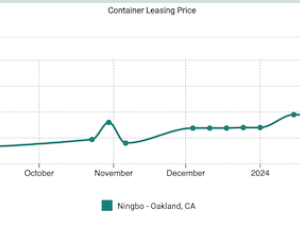Container shipping lines in the Asia-US trade lane announced a series of recommended action steps to improve bunker cost recovery, noting that the unprecedented escalation in fuel prices to recent record levels has created a critical situation that potentially threatens the industry's ability to service the trade.
The 14 major lines in the Transpacific Stabilization Agreement (TSA) estimate a gap in excess of $5 billion between what they spent on marine bunker fuel during the period from February 2006 through August 2007, and the total fuel surcharges they collected for that same period. Carriers say it is essential that they be able to recover a greater share of costs quickly and that fuel surcharges in all their contracts float with world fuel price fluctuations in world markets. Carriers say failure to fully recover fuel costs in their service contracts to date is not sustainable given current extraordinary fuel price levels.
'The contractual provisions that in some cases limited bunker recovery were entered into at a time when bunker costs were significantly lower, and when the recent spike in fuel costs could not have been anticipated,' according to TSA Executive Administrator Brian Conrad. 'We are now seeking customers' help in sharing in the exposure caused by this unexpected price escalation. It is only fair for carriers to recover these costs, as does virtually every other industry where extraordinary fuel costs are incurred.'
In response to this situation, TSA carriers have agreed to the following guidelines:
- All new service contracts for the 2008 contract season will be subject to full floating bunker surcharge in accordance with TSA's bunker formula.
- Where current contractual commitments have been met, carriers will seek an immediate adjustment in the contract to bring bunker recovery to a full floating basis. Some carriers may seek to accomplish this through application of a separate extraordinary bunker charge.
- Where contractual commitments are ongoing, carriers intend to contact customers who do not have the full floating bunker provision in their contracts to seek mutual agreement to increase the level of BAF recovery now, to a full floating basis.
These steps in connection with the bunker surcharge are in addition to the other revenue recovery steps for 2008 contracts that have already been announced.
'Our industry and the trade have to face some critical facts,' said TSA chairman Ronald D. Widdows. 'We're in a global market of nearly $100 a barrel for crude oil and over $500 a ton for bunker fuel ' up from $295 at the beginning of 2007. There's going to be volatility, and the overall price trend will be an upward one. There is no possible scenario under which container lines, with 50% of their operating costs per sailing tied up in fuel, can lock in a fuel surcharge for a year without hemorrhaging money, and eventually without carrier viability itself threatened. If not addressed, this situation would result not only in substantial losses for the carriers, it would also make it financially difficult for them to invest in the assets necessary to provide the service in the trade that shippers have come to expect.'





